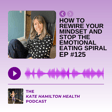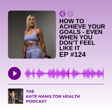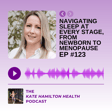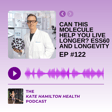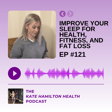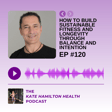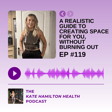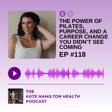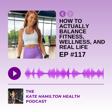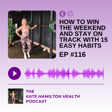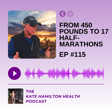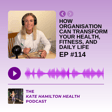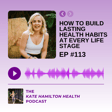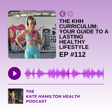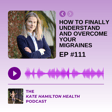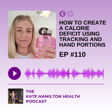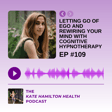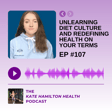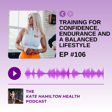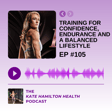
#108: Dr. Wolfgang Brysch: Bridging traditional medicine & modern science for longevity - nutrition, inflammation & aging
In this episode of The Kate Hamilton Health Podcast, I sit down with Dr. Wolfgang Brysch - renowned medical doctor, scientist, and co-founder of iüLabs - to explore the science behind healthy aging, inflammation management, and mitochondrial health.
With over 30 years of experience in pharmaceuticals, biotech, and medical innovation, Dr. Brysch shares cutting-edge insights on how traditional medicine and modern science intersect to optimize well-being.
We chat about the power of plant-based nutrition, energy metabolism, and supplementation to support longevity. Plus, Dr. Brysch breaks down the impact of chronic inflammation, daily routines, and sleep on overall health - and shares practical, science-backed strategies to help you age gracefully. Whether you're looking to boost your energy, enhance your nutrition, or understand the latest advancements in health science, this conversation is packed with actionable takeaways.
👉 Don’t forget to visit iulabs.co and use code HAMILTONHEALTH20 for an exclusive discount on recommended supplements!
Episode Highlights:
[00:00] Welcome to The Kate Hamilton Health Podcast
[00:13] Meet Dr. Wolfgang Brysch – His background in pharmaceuticals, biotech, and medical innovation
[03:09] The Science of Nutrition – How natural compounds impact longevity and disease prevention
[05:24] What Is Inflammation? – Understanding its role in aging and chronic disease
[07:15] Inflammation & Aging – How to manage inflammation for better health and longevity
[13:36] The Diet-Health Connection – Nutritional strategies to support energy and vitality
[20:55] The Power of Sleep & Daily Routines – Why consistent habits are key to longevity
[26:03] Digital Wellness – Managing screen time, notifications, and stress
[28:23] Supplements & Aging – The role of targeted supplementation in optimal health
[29:55] Healing from Within – How the body repairs itself and the role of pharmaceutical interventions
[32:17] Practical Supplement Advice – What to take and when for best results
[35:14] Mind-Body Connection – How mental and physical health go hand in hand
[37:17] Lifestyle Shifts for Longevity – Simple yet effective changes to improve overall well-being
[44:40] Final Thoughts – Key takeaways from Dr. Brysch’s research
[47:12] Closing Remarks – Where to learn more and how to stay connected
Links & Resources:
- Connect with Dr. Wolfgang via his website here
If you enjoyed this episode, please subscribe, leave a review, and share it with friends who might benefit. For more health and fitness tips, follow me on Instagram and TikTok @katehamiltonhealth.
Music b LiQWYD Free download: hypeddit.com/link/xxtopb [http://hypeddit.com/link/xxtopb] Promoted by FreeMusicPromo [https://www.youtube.com/channel/UCbycji-eySnM3WD8mbxPUSQ] / @freemusicpromo
